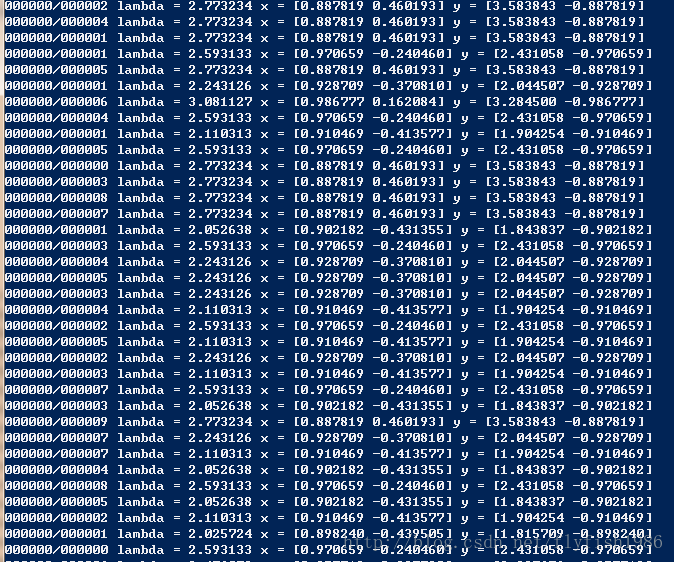TensorFlow - 使用TensorFlow开发程序编译环境配置
TensorFlow - 使用TensorFlow开发程序编译环境配置
flyfish
环境:Win7,Microsoft Visual Studio 2017 Community,平台x64
语言:C++
编译器配置如下
C\C++-》 常规-》附加包含目录
E:\lib\tensorflow
E:\lib\tensorflow\tensorflow\contrib\cmake\build
E:\lib\tensorflow\tensorflow\contrib\cmake\build\external\zlib_archive
E:\lib\tensorflow\tensorflow\contrib\cmake\build\external\gif_archive\giflib-5.1.4
E:\lib\tensorflow\tensorflow\contrib\cmake\build\external\png_archive
E:\lib\tensorflow\tensorflow\contrib\cmake\build\external\jpeg_archive
E:\lib\tensorflow\tensorflow\contrib\cmake\build\external\eigen_archive
E:\lib\tensorflow\third_party\eigen3
E:\lib\tensorflow\tensorflow\contrib\cmake\build\gemmlowp\src\gemmlowp
E:\lib\tensorflow\tensorflow\contrib\cmake\build\jsoncpp\src\jsoncpp
E:\lib\tensorflow\tensorflow\contrib\cmake\build\external\farmhash_archive
E:\lib\tensorflow\tensorflow\contrib\cmake\build\external\farmhash_archive\util
E:\lib\tensorflow\tensorflow\contrib\cmake\build\external\highwayhash
E:\lib\tensorflow\tensorflow\contrib\cmake\build\protobuf\src\protobuf\src
E:\lib\tensorflow\tensorflow\contrib\cmake\build\grpc\src\grpc\include
C\C++-》预处理器-》预处理器定义
WIN32
_WINDOWS
_DEBUG
EIGEN_AVOID_STL_ARRAY
NOMINMAX
_WIN32_WINNT=0x0A00
LANG_CXX11
COMPILER_MSVC
OS_WIN
_MBCS
WIN64
WIN32_LEAN_AND_MEAN
NOGDI
PLATFORM_WINDOWS
TENSORFLOW_USE_EIGEN_THREADPOOL
EIGEN_HAS_C99_MATH
TF_COMPILE_LIBRARY
CMAKE_INTDIR=”Debug”
链接器-》输入-》附加依赖项
有些lib是windows自己增加的
kernel32.lib
user32.lib
gdi32.lib
winspool.lib
shell32.lib
ole32.lib
oleaut32.lib
uuid.lib
comdlg32.lib
advapi32.lib
Debug\tf_protos_cc.lib
zlib\install\lib\zlibstaticd.lib
gif\install\lib\giflib.lib
png\install\lib\libpng12_staticd.lib
jpeg\install\lib\libjpeg.lib
jsoncpp\src\jsoncpp\src\lib_json$(Configuration)\jsoncpp.lib
farmhash\install\lib\farmhash.lib
fft2d\src\lib\fft2d.lib
highwayhash\install\lib\highwayhash.lib
protobuf\src\protobuf$(Configuration)\libprotobufd.lib
grpc\src\grpc$(Configuration)\grpc++_unsecure.lib
grpc\src\grpc$(Configuration)\grpc_unsecure.lib
grpc\src\grpc$(Configuration)\gpr.lib
wsock32.lib
ws2_32.lib
shlwapi.lib
使用TensorFlow自带代码示例
// MyTFTest.cpp : 定义控制台应用程序的入口点。
//
#include "stdafx.h"
#include means the result will be a
// float tensor even though the initializer has integers.
auto a = Const<float>(root, { { 3, 2 },{ -1, 0 } });
// x = [1.0; 1.0]
auto x = Const(root.WithOpName("x"), { { 1.f },{ 1.f } });
// y = A * x
auto y = MatMul(root.WithOpName("y"), a, x);
// y2 = y.^2
auto y2 = Square(root, y);
// y2_sum = sum(y2). Note that you can pass constants directly as
// inputs. Sum() will automatically create a Const node to hold the
// 0 value.
auto y2_sum = Sum(root, y2, 0);
// y_norm = sqrt(y2_sum)
auto y_norm = Sqrt(root, y2_sum);
// y_normalized = y ./ y_norm
Div(root.WithOpName("y_normalized"), y, y_norm);
GraphDef def;
TF_CHECK_OK(root.ToGraphDef(&def));
return def;
}
string DebugString(const Tensor& x, const Tensor& y) {
CHECK_EQ(x.NumElements(), 2);
CHECK_EQ(y.NumElements(), 2);
auto x_flat = x.flat<float>();
auto y_flat = y.flat<float>();
// Compute an estimate of the eigenvalue via
// (x' A x) / (x' x) = (x' y) / (x' x)
// and exploit the fact that x' x = 1 by assumption
Eigen::Tensor<float, 0, Eigen::RowMajor> lambda = (x_flat * y_flat).sum();
return strings::Printf("lambda = %8.6f x = [%8.6f %8.6f] y = [%8.6f %8.6f]",
lambda(), x_flat(0), x_flat(1), y_flat(0), y_flat(1));
}
void ConcurrentSteps(const Options* opts, int session_index) {
// Creates a session.
SessionOptions options;
std::unique_ptr session(NewSession(options));
GraphDef def = CreateGraphDef();
if (options.target.empty()) {
graph::SetDefaultDevice(opts->use_gpu ? "/gpu:0" : "/cpu:0", &def);
}
TF_CHECK_OK(session->Create(def));
// Spawn M threads for M concurrent steps.
const int M = opts->num_concurrent_steps;
std::unique_ptr step_threads(
new thread::ThreadPool(Env::Default(), "trainer", M));
for (int step = 0; step < M; ++step) {
step_threads->Schedule([&session, opts, session_index, step]() {
// Randomly initialize the input.
Tensor x(DT_FLOAT, TensorShape({ 2, 1 }));
auto x_flat = x.flat<float>();
x_flat.setRandom();
Eigen::Tensor<float, 0, Eigen::RowMajor> inv_norm =
x_flat.square().sum().sqrt().inverse();
x_flat = x_flat * inv_norm();
// Iterations.
std::vector 
